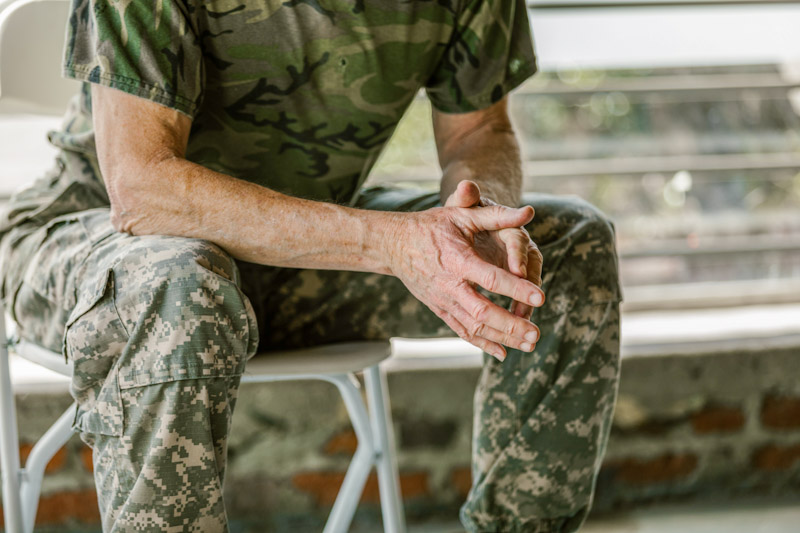Somatic Interventions Help Veterans With PTSD. Can They Aid Recovery Too?
Trauma can be devastating and extremely hard to shake. But an unconventional new body-focused therapy technique shows promise. Here's how it works

“When you serve in the military, you may be exposed to different types of traumas than civilians,” warns the National Center for PTSD. Service members often deploy in extremely high-stress, dangerous situations and environments. They may see and experience things most of us never do. The emotional toll of that can be devastating: According to the U.S. Department of Veterans Affairs, being a survivor of trauma puts people at a higher risk for suicide. The rate of suicide for veterans was 57.3% higher than for non-veteran adults in 2020.
Unfortunately, many post-traumatic stress disorder (PTSD) cases go untreated because they are not diagnosed, or the veteran does not have the resources and support to get the help they need. Historically, there has been stigma associated with mental health treatment, and that’s part of it too, but today, there is a more open dialogue about PTSD and the resources available.
One such resource found to be very helpful is the use of somatic interventions, a relatively new therapy technique. It’s already achieving results for veterans with PTSD — but others suffering trauma, including those in addiction recovery, could benefit too.
What Are Somatic Interventions?
Traditional talk therapy is tremendously valuable for many, but it has limitations for some, especially patients who dread reliving trauma. Somatic therapy relies on nonverbal communication when it offers a deeper understanding of a person’s mood, thoughts or feelings, and can provide insights into trauma that can’t readily be vocalized.
Somatic interventions (sometimes called somatic experiencing or somatic healing) have been characterized as “a body‐focused therapy used for treating people suffering from PTSD that integrates body awareness into the psychotherapeutic process, taking a unique approach not used by other PTSD treatment methods.” It’s a therapeutic method that identifies, defines and incorporates body movements and responses when navigating the traumatic recollection.
The benefit of this approach is that it does not require the individual to talk through the entire narrative of their experiences; it only requires the physical and emotional responses to the traumatic events.
Focusing on the Body To Work Through PTSD
Somatic interventions are still a somewhat new tool, but the results have been encouraging so far. The benefit of using somatic interventions for PTSD is that the individual does not have to revisit the specifics of their trauma or walk the treatment provider through their experiences. Instead, the focus is on the body’s response to the stressor, giving the individual the chance to work through the stress response and detaching that response from the memory.
Learning how to identify the stress response allows the individual to determine how stress is carried and felt in their body, which may in turn provide a greater chance of identifying and preventing the symptoms associated with PTSD. Somatic interventions encourage a person to be proactive instead of reactive in their engagement in coping skills.
Veterans can benefit significantly from somatic interventions because this therapy does not require them to mentally return to the trauma or environments of violence and war. Instead, they focus on how the stress has manifested itself in the body in the present moment.
The therapy may have a broad utility for many veterans: Many diagnosed with PTSD served in wars decades ago, so returning to their experiences may not always be helpful or useful. But these same veterans can still benefit from therapy and the use of somatic interventions by seeking to understand their stress responses and how they carry stress in their bodies. Focusing on the present symptoms and experiences instead of reliving the past is key.
A New Tool for Addiction Recovery?
Somatic interventions may be a constructive tool for individuals in recovery from drug or alcohol addiction as well. Being uncomfortable in one’s body due to thoughts, feelings, and a history of trauma or abuse is common among individuals who struggle with substance use. Substances provide what seems like a way to numb yourself and disengage from reality.
This is where somatic interventions may come in: They can help you identify how you experience this stress in the body, in the moment — knowledge that can create an opening for recovery and long-term sobriety. The therapy also teaches individuals how to work through the stress response and detach it from specific painful memories, just as it does for those suffering from PTSD. Diverting the focus away from the nervous system allows the individual to regain control and no longer feel mentally overpowered by the trauma.
In the earliest part of recovery, the body naturally becomes the focus, for better or worse: The process of withdrawal and detox is the primary concern, and that stress is front and center. Once the detoxification process is over, the focus tends to shift back to the mental and emotional components of recovery. Taking care of mental health is vital throughout recovery, but incorporating techniques that continue to engage the body and continue to identify stress responses allows for a more holistic approach to treatment.
It’s also worth noting that clearing your system of substances and completing detox doesn’t always halt all physical symptoms; somatic interventions can potentially aid in treating the whole person in the event of post-acute withdrawal syndrome (PAWS) as well.
Teaching individuals, whether in recovery from PTSD or addiction, how to be more connected to themselves and how to be better attuned to their bodies can increase their ability to communicate with themselves and others. A better understanding of yourself gives you the power to articulate your needs to others and begin to steer yourself toward a place of peace. At the end of the day, anything that could help is worth asking your counselor or mental health care provider about.
More Help & Information
Does the 'Pink Cloud' of New Sobriety Help or Hurt? It's Complicated
The euphoria of early recovery may be fleeting, but long-lasting balance is the goal. Here's how to keep your head up through the process and handle reality with confidence.
Sobriety vs. Recovery: What's the Difference?
Are the concepts themselves up for debate? Do they require certain treatments, or abstinence from everything? It's complicated! And new ways of thinking are changing the conversation.
Now Elite NFL Players, They First Tackled Addiction | News Roundup
All Sober compiles the best of the latest headlines. Here's your addiction and recovery news for the week of Feb. 19, 2024!
Help Them Help You: Explaining Your Mental Health to Your Family
Your mental health can affect — and be affected by — your loved ones. Here's how to discuss it with them so everyone can heal.
Dry January (and Beyond): The Possibilities Are Endless
There's never been a better time to go sober. Whether you're trying it out this month or already living the life, join us for some tips, ideas, inspiration — and maybe even new friends.
Sober Holiday Tips: Meeting 'Share-a-Thons'
Need to get out of the house for a bit and see some friendly sober faces? Recovery support group meeting marathons run 24/7 from Christmas Eve through New Year's Day.
What Happens After an Intervention?
Your loved one agreed to get treatment for addiction during their intervention — or not. Here's what you need to know about what comes next.
We're in This Together: Building a Healthy Sober Support Network
You are the captain of your recovery, but you don't have to do it alone. A sober support network will lift you up in tough times and celebrate your triumphs.











